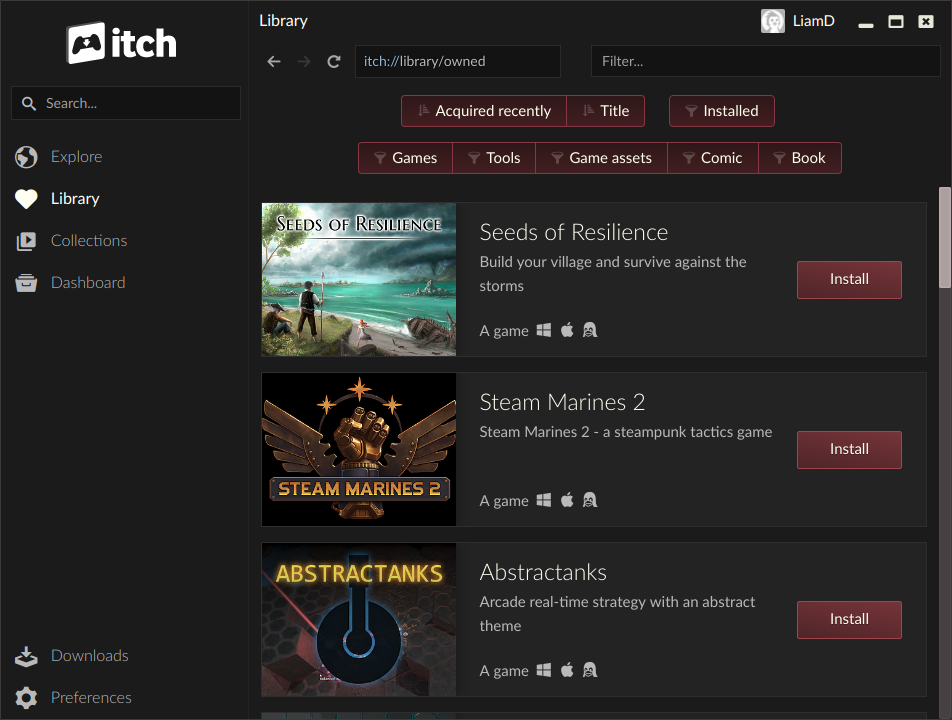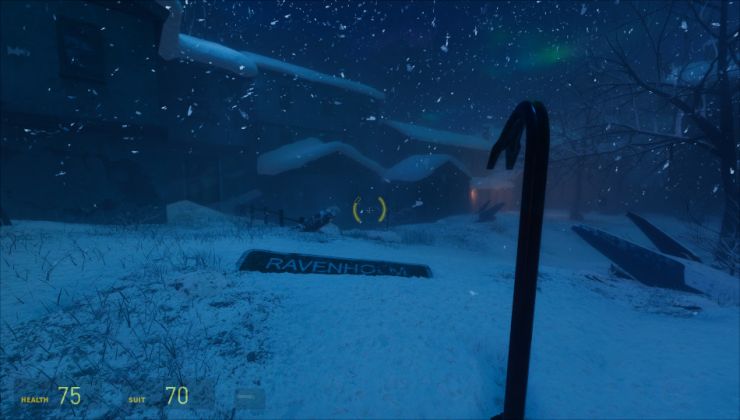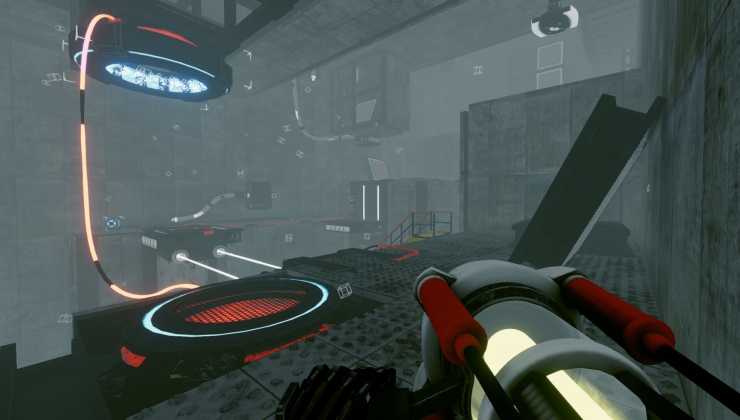Game store itch.io have a revamped desktop client coming and a beta is now available for users to test and report back.
The open source itch app was already pretty damn slick, I'm quite a fan of how easy it is to use. However, the team at itch have been working away for quite some time to improve it.
It does look rather slick still:
Here's the highlights of what's new:
- Starts up faster, interface is more reactive
- Uses less RAM, less CPU, less disk
- Compatible with more games
- Tab-less, multi-window design
- New installer, self-updates on Windows, macOS & Linux
Major parts of it have been rewritten, so they're going with a beta to ensure it's smooth for everyone. They say this release will also enable them to iterate on it faster in future, so hopefully major updates won't take so long in future.
As always, I love what they're doing and I do hope more developers put their games up on their store in future.
You can grab it here.
Some you may have missed, popular articles from the last month:
Quoting: tuubiAnd immediately you do something silly. Why would you not use the distro provided packages instead?Please, stop discussing other's silliness when you do not have all information at hand, OK?
Just this time, I will explain. There are reasons:
- My main distro (Fedora) has some strange ideas about license purity (or just plain bad taste), so distro-provided software is often assembled with multiple functions disabled;
- Even if the previous isn't the case, often distro-provided software is not up to date (this is true with basically every distro for some package or another) and manual downloading from developer is the first solution;
- It was you who made a statement that "*.deb" distribution is totally intuitive and Quote "Last time I tried, deb files were handled correctly in both Ubuntu and Mint, as their default "software stores" and (my preferred alternative) the gdebi-gtk helper application are both perfectly capable of checking and downloading dependencies." End Of Quote (Remember those words?), so I showed an example where it is totally not the case.
Quoting: tuubiYou're just looking for trouble here, even going for a huge piece of software that's bound to get complicated, then failing to follow the install guide provided by the developer. Sure, the install process is needlessly user-hostile (if you consider going to the terminal a big no-no), but that's entirely up to them, not the package management system.OK, using the link… reading:
QuoteOpen a terminal.First, a terminal! For a newbie, yeah, that should work just fine!
Change the current directory to the location of the .deb packages:
cd ~/Downloads/LibreOffice_6.0.x_Linux_x86_deb/DEBS
or for the 64 bits version:
cd ~/Downloads/LibreOffice_6.0.x_Linux_x86-64_deb/DEBS
(No need to write everything: use Tab ↹ to autocomplete the command line, or copy and paste with the middle-click mouse button)
Finally, install all .deb packages:
sudo dpkg -i *.deb
Second, I did exactly as was described!
What was your point in calling me doing silly actions or looking for trouble? This somehow was meant to prove your point of "DEB/RPM" distribution being intuitive and user-friendly? Or are you thinking I am stupid? Sorry, I do not get the point there. And I am not amused! :><:
Quoting: tuubiCan't decide, huh? You imagine games would keep updating their libs if they provided their own?Yes, they would. I see no technical difficulties for software to download and overwrite its own components, like this is done by Firefox and (was done while it was active) "Battle Worlds: Kronos", for example.
Quoting: tuubiThe runtime was a semi-successful attempt at providing a stable target "standard library" for games to rely on. The implementation is far from perfect, but game devs are not forced to make use of it so why not.It was never successful. One of the most common solutions on Steam to launch the game that does not work (because of the Steam Runtime libraries are incompatible with current kernels and system libs) is to run Steam in "Native" mode. And developers time and again acknowledged in their interviews that while at the beginning they were trying to target SteamOS™ (with its software) at the end they found out it was easier to just target Ubuntu.
Quoting: tuubiAnd I remember very well how much you love Steam from previous comment threads. :PWhethe I like Steam or not is irrelevant to this topic. :S:
0 Likes
Quoting: Alm888I didn't mean to upset you. Sorry about that. I'll do my best to avoid inflammatory language.Quoting: tuubiAnd immediately you do something silly. Why would you not use the distro provided packages instead?Please, stop discussing other's silliness when you do not have all information at hand, OK?
Quoting: Alm888I'd argue that this depends on distro. On Ubuntu the first solution is to look for a trusted PPA, and on Arch it might be to look for a suitable AUR package. Package quality can differ, but at least it integrates with the package manager. And of course, it's usually us more experienced users who'd even care about having the latest version of software. Common stuff like browsers tend to be kept up to date in supported distro releases anyway.Even if the previous isn't the case, often distro-provided software is not up to date (this is true with basically every distro for some package or another) and manual downloading from developer is the first solution;
Quoting: Alm888I do remember those words, and you seem to have misinterpreted them. I just tried again and installing debs manually using gdebi seems to work just fine. Trying to install one that has broken dependencies gives a clear error message and prevents installation, and installing the dependency first makes the error go away as expected. I wouldn't go as far as to say this is all perfectly intuitive of course. But neither is downloading and extracting a tarball or downloading an .sh installer, marking it executable and so on until the user has a basic understanding of Linux and their desktop.It was you who made a statement that "*.deb" distribution is totally intuitive and Quote "Last time I tried, deb files were handled correctly in both Ubuntu and Mint, as their default "software stores" and (my preferred alternative) the gdebi-gtk helper application are both perfectly capable of checking and downloading dependencies." End Of Quote (Remember those words?), so I showed an example where it is totally not the case.
Quoting: Alm888First, a terminal! For a newbie, yeah, that should work just fine!Did you miss this part in what you quoted from me: "Sure, the install process is needlessly user-hostile (if you consider going to the terminal a big no-no), but that's entirely up to them, not the package management system." Like I said, nothing to do with apt/deb, just the way the libreoffice packager decided to do it. Maybe they didn't expect a new user to look for and try a manual install. Fair enough I guess. You don't sound like a newbie to me.
Quoting: Alm888Second, I did exactly as was described!I do not think you're stupid or silly, just pointed out that you picked a bad example. And you didn't follow the instructions to the letter if you tried to install an individual package by itself. Though I still don't see why any normal user would install libreoffice manually on Ubuntu when the system packages are fairly recent and there's even an official PPA.
What was your point in calling me doing silly actions or looking for trouble? This somehow was meant to prove your point of "DEB/RPM" distribution being intuitive and user-friendly? Or are you thinking I am stupid? Sorry, I do not get the point there. And I am not amused! :><:
Quoting: Alm888Whether there are technical difficulties or not has very little to do with the fact that game devs tend to stop updating their dependencies at some point. And if they want to, they can just as easily override Steam runtime libs with their own local ones as needed. These approaches are not incompatible and use of the runtime is not enforced.Quoting: tuubiCan't decide, huh? You imagine games would keep updating their libs if they provided their own?Yes, they would. I see no technical difficulties for software to download and overwrite its own components, like this is done by Firefox and (was done while it was active) "Battle Worlds: Kronos", for example.
Quoting: Alm888Ubuntu is an officially supported Steam target platform so this makes perfect sense. I've never bypassed the runtime myself btw, but then again my gaming box is Nvidia/Intel and runs Mint, so I'm not exactly in the minority. Also, I said semi-successful, not successful. There's a difference. I have seen the problems this can and does cause for some users, especially on unsupported distributions.Quoting: tuubiThe runtime was a semi-successful attempt at providing a stable target "standard library" for games to rely on. The implementation is far from perfect, but game devs are not forced to make use of it so why not.It was never successful. One of the most common solutions on Steam to launch the game that does not work (because of the Steam Runtime libraries are incompatible with current kernels and system libs) is to run Steam in "Native" mode. And developers time and again acknowledged in their interviews that while at the beginning they were trying to target SteamOS™ (with its software) at the end they found out it was easier to just target Ubuntu.
0 Likes
Quoting: Alm888Quoting: ProfessorKaos64...wut. well if you don't want actual packages that integrate with your system libraries, you could always try those fancy snaps or flatpaks. Many package managers allow non root installs or "user" mode installs. Packages exist as they are the most logical approach for users of a distribution. Why package all the libraries for each when you can share them. It may be ages until there is a clear "winner" for a univeral(sic) approch(sic). I actually loathe firing up other package managers instead of using apt/yum/pacman. Using manual installers / shell scripts gets oflur(sic) of hand when the number of items increases.
Wut?! I seriously begin to think that there is a "Package Approach" sect.
We do not need any "winner" in the "DEB/RPM/WHATEVER wars". Ordinary user should not even know about this.
From a user's viewpoint it is completely irrelevant what package system his/her distro is using. The user in question must see "xxx updates available. Update the system?" and click "Yea, sure!" That's all! Have you ever tried to install *.deb or *.rpm package manually? I have. It does not work! I mean, doudleclicking on it does not work. Best case, some dialogue window appears and asks permission to install, but if the package in question has dependencies then -- BAM -- the process fails. Because there are no mechanisms for dependency solving without repositories. "Command line" (terminal emulator) and manual downloading of required packages from some site like this are in order. This is BS.
From an administrator's viewpoint it is serious security breach to install some unsigned (or self-signed with shady keys) software in system-critical portions of the filesystem ("/usr/bin", "/usr/lib64" etc.) probably adding third-party open keys as trusted in the process. This is total BS!
User oriented entertainment software should not be installed system-wide!
And in case someone wondered, even user-level installed software can be added to auto-loading during startup and applications menu (AKA "Start Button"), see XDG specification.
The entire point is sane management. I suppose I can't argue with you. GPG keys exist for a reason. Sure someone software is convenient as a binary or archive. If I wasn't on mobile. Are you a devop/RHEL/Admin/Hadoop devop? Thanks I'd where I come from. Manually installed software is not what you want, so I can't agree there. Non-signed manual installation of RPMs is insane. You shouldn't be installing things like that anyway if you are going the manual approach. Yum local install exists as well. There is no war, not sure where that was picked up on. For games, I can see some merit for a contained/flatpak type approach. Overall, not using something* to manage software is exactly why bitrot was coined a term. Unfortunately, we still have old software that goes unmaintained. Sigh.
0 Likes








See more from me